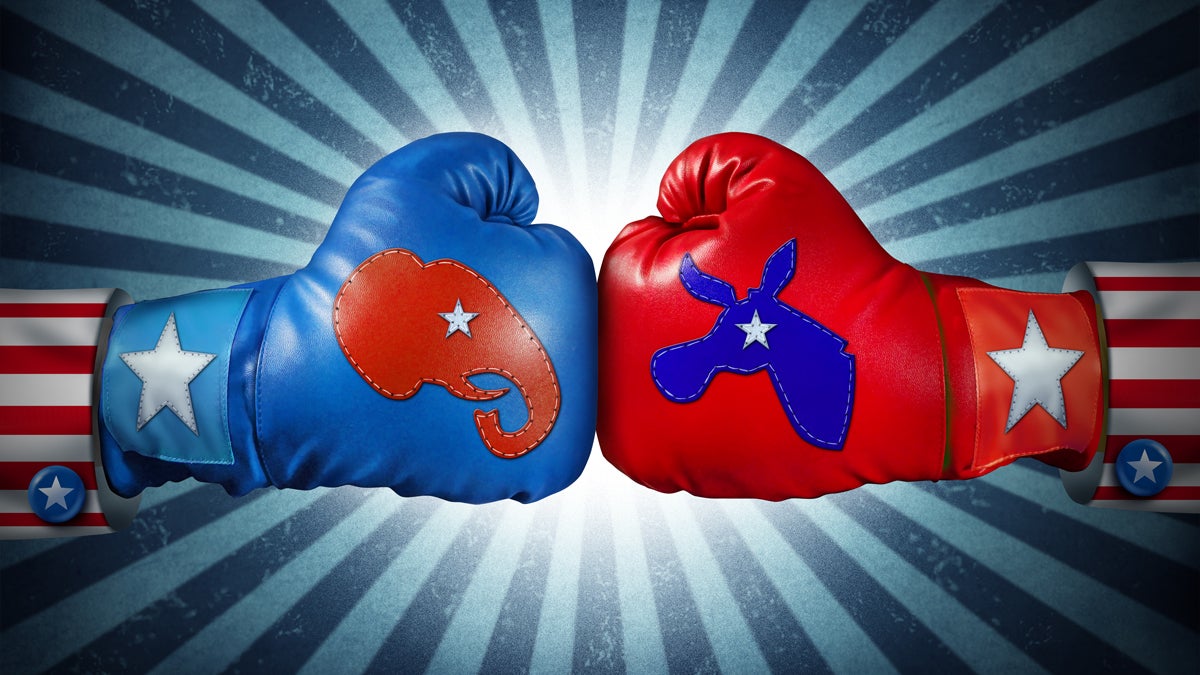Think Congress is dysfunctional? The FEC is even worse
 Photo via ShutterStock) " title="ssdonkeyelephantx1200" width="1" height="1"/>
Photo via ShutterStock) " title="ssdonkeyelephantx1200" width="1" height="1"/>
(Photo via ShutterStock)
Sometimes the best stories about the worst of Washington are the ones we overlook.
So today, let’s fly below the radar and visit the perpetually dysfunctional Federal Election Commission, an alleged watchdog agency that makes Congress look like a bipartisan nirvana.
Few Americans, and few journalists, pay much attention to the FEC – which by law is supposed to “prevent corruption in the federal campaign process” – and that’s a shame, because its routine aiding and abetting of corruption is actually quite newsworthy. Just last month, for instance, the FEC’s general counsel found “reason to believe” that Karl Rove’s secretive Crossroads GPS has repeatedly violated federal law – but the probe was shut down because the FEC’s six commissioners gridlocked on whether to proceed. Three commissioners are Democrats, and three are Republican. You can easily figure out who said yes to proceed, and who said no.
In fact, that’s how their votes always go. On any remotely important enforcement issue, they gridlock along party lines. And the FEC’s critics, who care deeply about fighting corruption, are increasingly apoplectic. Adam Skaggs of the Brennan Center for Justice says the FEC “is utterly incapable of enforcing the nation’s campaign finance laws.” Frank Reiche, a Republican who served as an FEC commissioner in the early ’80s, says “the agency is almost doomed to failure.”
Worst of all is the verdict rendered by the Center for Public Integrity, a public interest group that assessed the FEC in a damning report released in January. The killer quote: “As the nation heads into what will undoubtedly be the most expensive midterm election in history, and a 2016 presidential election that, in no small way, has already begun, the FEC is rotting from the inside out.”
Granted, the FEC occasionally has its act together. For instance, it has been stubbornly pursuing Larry “Wide Stance” Craig, the Idaho senator who was arrested at an airport in 2007 after he played footsie with the guy in the adjacent bathroom stall. Craig paid his legal fees by raiding his campaign kitty; the FEC thinks he was wrong to do that, and wants him to repay the money. Craig’s defense (get this, folks) is that raiding his campaign kitty was proper, because at the time of his footsie he was traveling between Idaho and Washington in his official capacity as a senator.
But enough comic relief. Back to our main story.
Clever political operatives (like Karl Rove) run rings around the FEC, because they know full well that the watchdogs are too paralyzed to bite. Because in this era of ideological gridlock, the FEC is virtually set up to fail. It’s longstanding custom that three Democratic commissioners serve with three Republican counterparts. But the big problem, increasingly over the years, is that the two camps are on opposite sides of an unbridgeable ideological divide. As the Center for Public Integrity report puts it, the camps “have radically different views…on how elections should be waged.”
Not surprisingly, the Democratic commissioners believe the FEC “should be a strong regulatory force that checks the political influence of corporations and wealthy donors,” whereas the Republican commissioners think the opposite, that instead the FEC “should above all ensure the free speech rights of political actors – rights they believe should include the raising and spending of big money to either promote or lambaste political candidates.”
In the words of Trevor Potter, another former Republican commissioner quoted in the report, “Today, there’s a lack of consensus on the FEC as to what the FEC’s job even is…this deadlocking and inaction is not healthy for our system.”Yeah, no kidding. The handling of the Karl Rove case is a classic example of ill health.
The FEC general counsel, and his staff, found ample evidence that Crossroads GPS had violated three provisions of federal law. Rove’s group had organized itself as a nonprofit “social welfare” agency; under the tax code, these agencies don’t have to reveal the names of their donors. (Thus making Crossroads GPS a perfect haven for secretive fat cats.) But the prime mission of these agencies is supposed to be, you know, “social welfare” – not politics. The prime mission of Crossroads GPS, as amply documented in the report, has been politics. Therefore, Rove’s group was not really a “social welfare” agency. Therefore, it had no right to hide the identities of its donors.
The general counsel asked the six commissioners to OK a full investigation, to “enhance the public record” and compel Rove’s group to properly register itself as a political committee with a public list of donors. Didn’t happen. The Republican commissioners said no, end of story. Rove owes a debt of gratitude to Sen. Mitch McConnell, who by custom is accorded the privilege of choosing Republican commissioners who won’t enforce the law. (Officially, President Obama has the power to nominate all six commissioners, but that’s another war he prefers not to wage.)
Sorry to get down in the weeds on this issue, but power is so often wielded in the weeds. And since the Citizens United ruling guarantees an unprecedented flood of special interest and fat cat money in 2014, rest assured that the “social welfare” agencies – including the Democratic groups bent on mimicking Rove – will find creative ways to exploit the FEC’s paralysis.
To quote one newspaper report, “Once hailed as the two-fisted enforcer that would protect the body politic from future Watergate scandals and the corrupting scourge of unregulated campaign cash, the commission has proved to be weak, slow-footed and largely ineffectual.” So said The Washington Post. In a story that ran 17 years ago.
Follow me on Twitter, @dickpolman1
WHYY is your source for fact-based, in-depth journalism and information. As a nonprofit organization, we rely on financial support from readers like you. Please give today.

